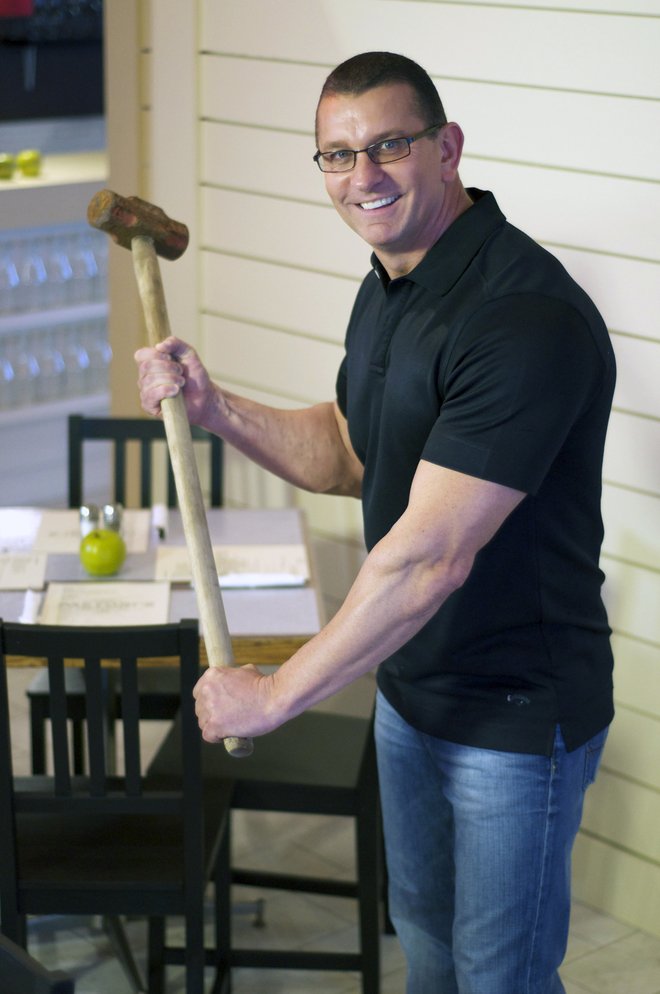
People often ask me to define cognitive behavioral therapy (CBT) in simple terms. A great example of CBT at work can be viewed at an unlikely source: Chef Robert Irvine’s Food Network series, Restaurant Impossible.
FoodTV.com describes the show as follows: “Turning around a failing restaurant is a daunting challenge under the best of circumstances. Attempting to do it in just two days with only $10,000 may be impossible. But Chef Robert Irvine is ready to take on the challenge. He’ll channel MacGyver and use a lot of muscle to rescue these desperate places from complete collapse. Can one man, in two days, with just $10,000, turn the tide of a failing restaurant and pave the road to a successful future?”
A good promo, indeed. But a surprising side benefit of this show is seeing human psychology in action. Irvine proves to be not only a great chef, but also someone who understands the importance of communication, relationships, and best of all, cognition.
The great majority of failing restaurants are family run. Dysfunction and disorder are clearly at the core of what’s driving them into failure. In show after show, Irvine tells his clients, “If you don’t fix what’s wrong in your family relationship, nothing else we do here will matter.”
But what’s even more remarkable is how Irvine goes about fixing the problems beyond the menu and the physical condition of the restaurant. In one recent episode, he tried to help a feuding mother and daughter with a failing restaurant in Delaware. After pointing out the obvious tension between them, he told each to go home and write down what the other was doing wrong, and report on it the next day. In the same episode, he asked the owner/mother to write down her reasons for keeping an unconventional item on the menu, while he wrote down his reasons for dropping it. They posted their reasons on a board and considered the options. Apparently the problems went deeper than Irvine’s 2-day efforts could reach, and the restaurant finally closed for good.
Many restaurant problems extend to poor relations between management and staff, with the staff mirroring the family’s issues. In creative exercises, Irvine gets the owners and staff to write down anonymous replies to questions such as, “Who is the main problem here, and what is he/she doing wrong?” By getting everyone together to think about the glitches contributing to the restaurant’s failure, he invests them emotionally and motivates them to work harder for their own sake, i.e., more customers mean more tips, etc.
The common denominator in these exercises is not just communication. It’s thought. In fact, he tells people to think and identify the ideas lurking beneath their irrational and/or contradictory emotions. He then encourages them to act in a way consistent with reality and common sense. Whether it works over time is of course up to the owner. But Irvine, like any good cognitive psychotherapist, understands that thinking and follow-through are the only ways to resolve any human problem.
Irvine’s muscular stature presents an almost comic-book hero image of the kindly tough guy. However, he’s less brawn and more brain as he seeks out and identifies errors and contradictions in people’s thinking — and then calls them on those contradictions in a direct way. It’s remarkable how many people, even highly defensive ones, respond to the truth when delivered in a candid and honest manner. Irvine understands that the human mind cannot sustain contradictions, and that a business that depends on teamwork cannot remain viable in the midst of inconsistency, hidden agendas and passive-aggressive behaviors.
Of course the dramatic refurbishing of the restaurant’s décor and menu doesn’t hurt, and follow-up reports on FoodTV’s website indicate that some of the restaurants actually go on to success. Some, however, enjoy a momentary spark of triumph, then fall back into their old habits and fail anyway. But there’s no question that Irvine leaves them with the culinary, management and psychological tools required to survive.
There’s no psychobabble on Restaurant Impossible. It’s simple, straight-ahead cognitive psychology, correctly understood and rationally applied in a real-world setting. Irvine is not necessarily right all the time, but he’s consistently objective and thoughtful in his quest to help people use their brains, and not just their emotions, to achieve a difficult – but not impossible – goal.
Follow Dr. Hurd on Facebook. Search under “Michael Hurd” (Rehoboth Beach DE). Get up-to-the-minute postings, recommended articles and links, and engage in back-and-forth discussion with Dr. Hurd on topics of interest. Also follow Dr. Hurd on Twitter at @MichaelJHurd1
Dr. Hurd is now a Newsmax Insider! Check out his new column here.
